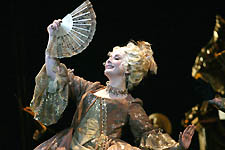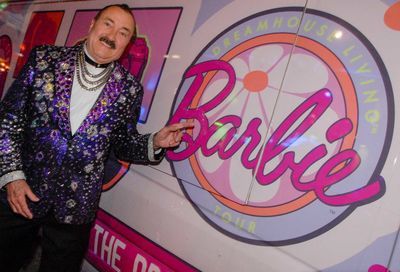Mais Non, Manon!
Puccini's ''Manon Lescaut'' at Kennedy Center
Two subtle re-alignments greet this season’s returning opera-goers: The Washington Opera is now called the Washington National Opera and the Kennedy Center Opera House has new (non-ergonomic) seats, floors and a mid-orchestra
aisle. So farewell to DAR. It’s nice to be back in the red retro splendor of the Opera House experiencing those comfortingly familiar back spasms.
Our patience with the spatial challenges of DAR is rewarded with this absorbing, innovative staging of Giacomo Puccini’s Manon Lescaut. Director, set and costume designer John Pascoe brings a holistic sensibility to the production, using every inch of the theater space to involve lighting,
texture and interesting combinations of media. As the ear listens, the eye is inextricably drawn into the production’s visual layers, and the contrasts between the drama, the music and what we see is often stunningly potent. Though this distinguishes the production, it sadly cannot quite make up for the deeply unsympathetic foibles of milady Lescaut.
 |
There is no doubt that Manon is beautifully sung by star soprano Veronica Villarroel. Her voice, offering spectacular power and range, has a sweetness and buoyancy that defies gravity. It’s easy to see why Villarroel is renowned for her Madama Butterfly. But Manon Lescaut is about as shallow and
narcissistic (and arguably schizophrenic) as you can get in 18th Century France without drawing a crowd. She is so strikingly disturbed by contemporary standards, her behavior strains credulity — even the highly elastic credulity afforded opera heroines.
And though Villarroel nobly embraces the role and sings like she means every word, for the modern viewer, Manon’s twisted values constantly chip away at the emotional tension. In his style, Puccini has woven deeply mournful themes throughout the lustrous music, themes that touch on the despair of lost love and ultimately, the loss of life. As set designer, Pascoe has matched these moods with originality.
But the end result is that Manon seems an anomaly in her own opera. Who is this fickle, gold-digging diva? What does she have to do with the existentially earnest pauper Des Grieux, who truly loves her and risks all for her. Doesn’t she really belong in a comedy of manners? The heartsick
angst of Des Grieux generates pathos, but even as Manon faces her own death, she is complaining that she has been abandoned, right after insisting that her lover leave.
Perhaps the only time Manon’s silliness actually comes together with the imaginative craft of Pascoe is in the second act, where we see her finally surrounded by the wealth and attention she craves.
Act two is set in Manon’s fabulously opulent boudoir in the home of Geronte de Revoir, the man she has clearly married for his money. Though she pines for her impoverished, but supposedly true love Des Grieux, Manon is clearly
equally in love with the trappings of wealth. In keeping with the excellent use of imagery, her bedroom is dominated by six gigantic armoires topped with wonderfully sinister ancestral busts. The cabinets contain her magnificent gowns or jewels, each a testament to her shallow quest for wealth. The way in which these massive wardrobes work against the stage perspective, looming and yet silent, is positively nightmarish. Manon proceeds to dance for her doting husband in and around these behemoths, finally ending up inside one. The entire sequence is extraordinary, by turns enchanting and grotesque.
|
Though Manon seems a misfit, her lover Des Grieux fits hand in glove with the dark intensity of the music. Lovelorn, yet furious with the fly-by-night Manon, Des Grieux angsts and sings his heart out. Tenor Franco Farina has a somewhat less than crisp voice, especially compared with the
precise elocution of Villarroel, but he more than makes up for it with his power in the upper registers and his no nonsense stage presence.
Finally, the orchestra, under the passionate hand of conductor Placido Domingo, seems happy to be back home and they play with commensurate spirit.
-30-
Support Metro Weekly’s Journalism
These are challenging times for news organizations. And yet it’s crucial we stay active and provide vital resources and information to both our local readers and the world. So won’t you please take a moment and consider supporting Metro Weekly with a membership? For as little as $5 a month, you can help ensure Metro Weekly magazine and MetroWeekly.com remain free, viable resources as we provide the best, most diverse, culturally-resonant LGBTQ coverage in both the D.C. region and around the world. Memberships come with exclusive perks and discounts, your own personal digital delivery of each week’s magazine (and an archive), access to our Member's Lounge when it launches this fall, and exclusive members-only items like Metro Weekly Membership Mugs and Tote Bags! Check out all our membership levels here and please join us today!




















